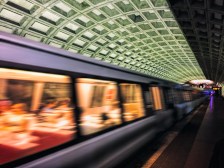Northern Virginia city, Virginia Tech plan smart-city test bed

Officials in Falls Church, Virginia, plan to enlist Virginia Tech University and local transportation agencies to create a smart city “test bed” across 44 acres in the 15,000-person city later this year.
With help from the Virginia Tech Transportation Institute and the Virginia Department of Transportation, the Washington, D.C., suburb will outfit a transportation grid with connected technologies increasingly common in larger cities, like adaptive street lights, connected traffic signals and sensors that help residents use their smartphones to find parking spaces.
The grid will be constantly updated with emerging technology thanks to Virginia Tech’s research, said Wyatt Shields, Falls Church’s city manager. And the Washington Metropolitan Area Transit Authority — the D.C. region’s public transit provider — will be folded into the development and technology installation, Shields told StateScoop.
“We want to use it as a springboard for technology that we think, probably, will ultimately be universal throughout cities. So that’s a key part of this,” he said. “We’re hopeful that we can be early adopters of technology that will work well and be practical and useful for people.”
The project, which will receive $10 million through the Virginia Department of Transportation pending Gov. Ralph Northam’s approval, could collect data from connected vehicles, track pedestrian behavior or monitor police and fire incidents within the 44 acre region, according to Virginia Tech.
The university and Falls Church will develop standards together around data storage and security, as well as an access-management system that would enable real-time decision making based on the data. The benefit for the city in developing the area, Shields said, will be saving money and enticing industry to pilot their emerging technology within the site.
“A lot of the smart-cities infrastructure is just really good design, so that it’s safe for pedestrians, safe for bicyclists, safe for transit obviously,” Shields said. “WMATA bus lines traverse this site and we want them to be integrated in safely and efficiently.”






